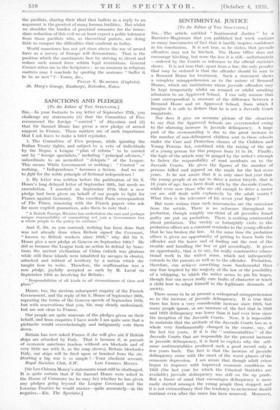SANCTIONS AND PLEDGES
[To the Editor of Tim Sancralsaa.]
Sm,—In your footnote to my letter of September 27th, you challenge my statements (1) that the Committee of Five recommend the foreign " control " of Abyssinia and (2) that Sir Samuel Hoare has given a new pledge of armed support to France. These matters are of such importance that I ask leave to make a brief rejoinder.
1. The Committee of Five propose, while ignoring the Italian Treaty rights, and subject to a veto of individuals by the Negus, a League " plan of reform " to be carried out by " foreign specialists," including " principal advisers,"
subordinate to an accredited " delegate " of the League. This means White Government or nothing ; " Control " or nothing. " Independence " becomes a fiction. And we are to fight for the noble principle of fictional independence I
2. My letter was written before the publication of Sir S. Hoare's long delayed letter of September 26th, but needs no emendation. I asserted on September 27th that a new pledge had been given on behalf of our people to fight for
France against Germany. The excellent Paris correspondent of The Times, reasoning with the French papers who ask
for more explicit guarantees, asks them to note that : " A British Foreign Minister has undertaken the rare and perhaps unique responsibility of committing not just a Government but a whole people to the policy he outlines."
And if, Sir, as you contend, nothing has been done that was not already done when Britain signed the Covenant, " known to British workers since 1919," why did Sir S. Hoare give a new pledge at Geneva on September 10th ? He did so because the League took no action to defend by Sanc- tions the ancient civilisation of China (which was glorious while still these islands were inhabited by savages in clouts), attacked and robbed of territory by a nation which she taught how to write. Therefore, the reaffirmation was a
new pledge, joyfully accepted as such by M. Laval on September 13th as involving for Britain :
" Responsibilities of all kinds in all circumstances of time and place."
Hence, too, the anxious subsequent enquiry of the French Government, and the reply of Sir S. Hoare of September 26th, repeating the terms of the Geneva speech of September 10th, but with reservations that you, Sir, may clearly understand, but are not clear to France.
Our people are quite unaware of the pledges given on their behalf, and from enquiries I have made I am quite sure that a plebiscite would overwhelmingly and indignantly vote them down.
Britain his now asked France if she will give aid if British ships are attacked by Italy. That is because if, in pursuit of economic sanctions (useless without sea blockade and of very little use with it, as the map shows), Britain blockades Italy, our ships will be fired upon or bombed from the air.
Starting a big war is so simple 1—Your obedient servant,
[Sir Leo Chiozza Money's statements must still be challenged. It is quite certain that if Sir Samuel Hoare were asked in the House of Commons (as he may be) whether he has given any pledges going beyond the League Covenant and the Locarno Treaties he would answer—quite accurately—in the mcgative.—En. The Spectator.]










































 Previous page
Previous page